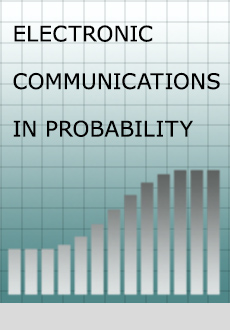Abstract
Let $\alpha :[0,1]\to [0,1]$ be a measurable function. It was proved by P. Marchal [2] that the function \[ \phi ^{(\alpha )}(\lambda ):=\exp \left [ \int _0^1\frac{\lambda -1} {1+(\lambda -1)x}\,\alpha (x)\,\mathrm{d} x \right ],\quad \lambda >0 \] is a special Bernstein function. Marchal used this to construct, on a single probability space, a family of regenerative sets $\mathcal R^{(\alpha )}$ such that $\mathcal{R} ^{(\alpha )} \stackrel{\text {law}} {=} \overline{\{S^{(\alpha )}_t:t\geq 0\}} $ ($S^{(\alpha )}$ is the subordinator with Laplace exponent $\phi ^{(\alpha )}$) and $\mathcal R^{(\alpha )}\subset \mathcal R^{(\beta )}$ whenever $\alpha \leq \beta $. We give two simple proofs showing that $\phi ^{(\alpha )}$ is a complete Bernstein function and extend Marchal’s construction to all complete Bernstein functions.
Citation
Chang-Song Deng. René L. Schilling. "Complete Bernstein functions and subordinators with nested ranges. A note on a paper by P. Marchal." Electron. Commun. Probab. 21 1 - 5, 2016. https://doi.org/10.1214/16-ECP31
Information





